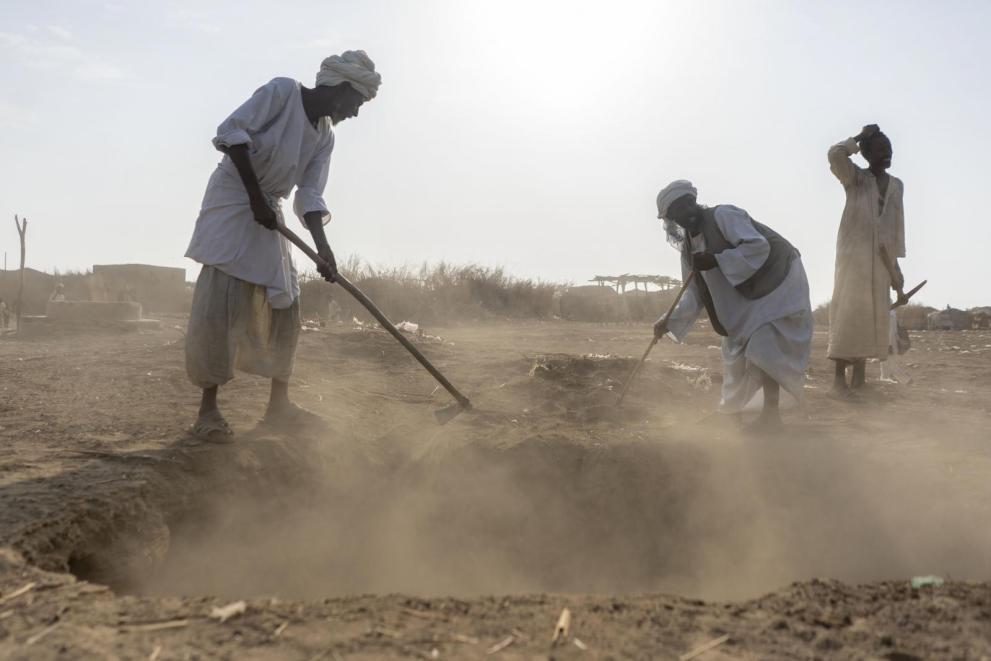
Sudan faces a growing humanitarian need. 5.8 million people across the country are unsure where their next meal will come from. With the support of the EUTF, the World Food Programme (WFP) is finding creative ways to support the Government’s social safety nets system through its resilience programming.
Osman Hamad is a member of the village development committee and headmaster of a village school in Eastern Sudan. Like many others in the country, his village faces food insecurity despite having an economy focused on agriculture. Because of recurring climate shocks, shortages in fuel and low-scale production, harvests here are not consistent. Even when harvests are good, food stocks deplete during the breaks between them. In these periods, many villagers have no access to other forms of employment and so end up struggling to feed their families.
Eastern Sudan has one of the highest poverty and malnutrition rates in the country, making it a target area for WFP livelihood and resilience-building activities. The people living there are especially vulnerable during the agricultural lean season (break between harvests) when food stocks deplete. During this season, there are no other means of livelihood or income generating activities that would enable families to meet their basic food security needs.
Funded by the EUTF, the WFP’s Productive Safety Nets (PSN) project aims to help resident food insecure populations create or rehabilitate community assets in exchange for cash payments. Communities gather through local PSN committees to decide which assets would be most useful, acknowledging that ideas tend to be better when they come from the affected people and communities themselves.
In Osman’s village, the WFP is helping address food insecurity and create job opportunities between harvests. As part of its Productive Safety Nets (PSN) project, the village community has cleared muskeit trees, creating land that will become a village farm. In exchange for their contribution, participants have received cash payments from the WFP. The area is now free of the mosquitoes that used to live in the muskeit trees.
“Thanks to PSN projects, we are enjoying clean drinking water. The area is now free of the mosquitoes which used to live in the muskeit trees now being cleared through this project. Also, the money injected into the community helps the local market and creates more opportunities for the people," Osman explains.
Osman notes that the project has even increased the number of girls attending lessons. “As a school headmaster, I have also noticed that girls’ attendance in the community has significantly improved. This is clearly the impact of the money being paid to project participants. In the past, girls were shy to attend school because they didn’t have proper uniforms. Now parents can afford to buy new uniforms and to cover other school needs,” he says.
“The project has also encouraged the return of residents who previously migrated to bigger towns to find work. Many have returned and settled in the village where they can now participate in asset creation for the benefit of the community,” said Osman Hamad.
The Productive Safety Nets programme seeks to help food insecure populations create or rehabilitate valuable community assets. Assets targeted include water reservoirs, community farms, gardens, and land such as that described above. The asset must enhance community productivity, but it is left up to the communities themselves to decide which assets would be most valuable for them to develop. In return for their participation in the project, individuals receive cash payments via a mobile bank. In this way, PSN bolsters the Sudanese government’s social safety nets system. Indeed, the project is organised in close partnership with Sudan’s Ministry of Labor and Social Development.
Saadiya Mohamed Ahmed is another beneficiary of the programme in the same village as Osman Hamad. She has been able to use the freshly uprooted muskeit trees as raw material to make decorative items. Saadiya received training through the PSN on how to create handicrafts from local resources. She now sells her products in the local market and shares the profit with the thirty other women who are participating in this community handicrafts project. Thanks to PSN, Saadiya also obtained a two-month payment worth SDG 3,000 (approximately USD 40). She has used this money to pay her loans in the village shop. “I now plan to save money and establish a small boutique or fish processing project”, she says. Ultimately, the PSN programme seeks to improve the lives of 400,000 Sudanese villagers like Saadiya.
In September 2019, the programme started providing beneficiaries with cards which they use to get their entitlements from a mobile bank at the village. PSN aims to help buffer the impacts of Sudan’s economic challenges and more broadly, help develop the resilience of communities. In partnership with the Ministry of Labor and Social Development, the Productive Safety Nets Programme aimed to reach 400,000 people in 2019.
Details
- Publication date
- 24 January 2020
- Region and Country
- Sudan
- Thematic
- Greater economic and employment opportunities
- Partner
- World Food Programme
